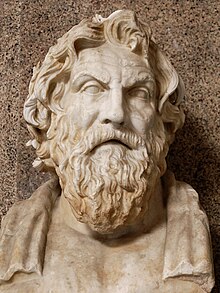
Back أنتيستنيس Arabic انتيستنيس ARZ Antístenes AST Antisfen Azerbaijani Антысфен Byelorussian Антистен Bulgarian Antistenes Breton Antístenes d'Atenes Catalan Antisthenés Czech Antisthenes Danish
Antisthenes | |
|---|---|
 Portrait bust of Antisthenes, found at the Villa of Cassius at Tivoli, Lazio, 1774 (Museo Pio-Clementino) | |
| Born | c. 446 BCE[1] |
| Died | c. 366 BCE[1] (aged approximately 80) Athens |
| Era | Ancient Greek philosophy |
| Region | Western philosophy |
| School | Cynicism |
Main interests | Asceticism, ethics, language, literature, logic |
Notable ideas | Laying the foundations of Cynic philosophy Distinction between sense and reference |
Antisthenes (/ænˈtɪsθɪniːz/;[2] Ancient Greek: Ἀντισθένης, pronounced [an.tis.tʰén.ε:s]; c. 446 – c. 366 BCE)[1] was a Greek philosopher and a pupil of Socrates. Antisthenes first learned rhetoric under Gorgias before becoming an ardent disciple of Socrates. He adopted and developed the ethical side of Socrates' teachings, advocating an ascetic life lived in accordance with virtue. Later writers regarded him as the founder of Cynic philosophy.
- ^ a b c Luz, Menahem (2019). "Antisthenes' Portrayal of Socrates" from "Brill's Companion to the Reception of Socrates". Koninklijke Brill NV, Leiden, The Netherlands: Brill. p. 124. ISBN 978-90-04-39674-6.
- ^ Jones, Daniel; Roach, Peter James; Hartman, James; Setter, Jane, eds. (2006). Cambridge English Pronouncing Dictionary (17th ed.). Cambridge UP.